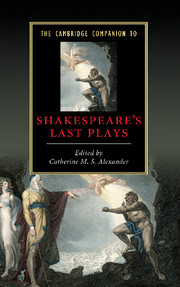Book contents
- Frontmatter
- Introduction
- 1 What is a ‘late play’?
- 2 Blackfriars, music and masque: theatrical contexts of the last plays
- 3 The literary and dramatic contexts of the last plays
- 4 Politics, religion, geography and travel: historical contexts of the last plays
- 5 ‘You speak a language that I understand not’: listening to the last plays
- 6 The Winter’s Tale: shifts in staging and status
- 7 Cymbeline: the afterlife
- 8 Literary invocations of The Tempest
- 9 Pericles: the afterlife
- 10 The Two Noble Kinsmen and King Henry VIII: the last last plays
- Further reading: Clare Smout
- Index
5 - ‘You speak a language that I understand not’: listening to the last plays
Published online by Cambridge University Press: 28 May 2010
- Frontmatter
- Introduction
- 1 What is a ‘late play’?
- 2 Blackfriars, music and masque: theatrical contexts of the last plays
- 3 The literary and dramatic contexts of the last plays
- 4 Politics, religion, geography and travel: historical contexts of the last plays
- 5 ‘You speak a language that I understand not’: listening to the last plays
- 6 The Winter’s Tale: shifts in staging and status
- 7 Cymbeline: the afterlife
- 8 Literary invocations of The Tempest
- 9 Pericles: the afterlife
- 10 The Two Noble Kinsmen and King Henry VIII: the last last plays
- Further reading: Clare Smout
- Index
Summary
Around 1608, Shakespeare changed direction. He had done so before, notably in taking up the tragic mode at the turn of the century. After following that impulse through the sequence of major tragedies, he seems to have been drawn to a different kind of story, devising a new dramatic mode and giving his characters a new style of poetry to speak. When he had completed Macbeth and perhaps Coriolanus or Antony and Cleopatra (or perhaps both), he helped to finish Pericles, collaborating with George Wilkins or possibly rescuing an effort Wilkins had begun; between 1608 and 1611 he wrote three plays on his own, Cymbeline, The Winter's Tale and The Tempest; at the end of this phase, from about 1611 to 1613, he collaborated with John Fletcher on Henry VIII, The Two Noble Kinsmen, and Cardenio, now lost. Modern scholarship cannot decide what to call these seven plays, indeed can scarcely agree on what to call any one of them: Comedy? Romance? Pastoral? Tragicomedy? Whatever the designation, Shakespeare's shift from tragedy to the new form coincided with, and is related to - both as cause and effect - his development of a poetic style like nothing he (or anybody else) had composed before: it is audacious, irregular, ostentatious, playful, and difficult. What follows amounts to a descriptive account of this late verse, especially its relation to the experimental form. The last plays have provoked a wide range of responses, from Edward Dowden's reverential, Victorian picture of the playwright comfortably resting 'on the heights' after achieving spiritual victory and serenity, to Lytton Strachey's modernist view that Shakespeare was bored, 'bored with people, bored with real life, bored with drama, bored, in fact, with everything but poetical dreams'.
- Type
- Chapter
- Information
- The Cambridge Companion to Shakespeare's Last Plays , pp. 91 - 112Publisher: Cambridge University PressPrint publication year: 2009
- 2
- Cited by



